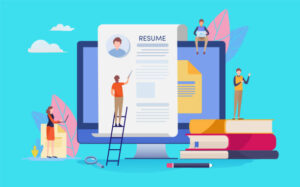Writing a CV that “stands out”
It’s something we get asked a lot – and if you speak to any of my family and friends, I’ve formatted my fair share of their CV’s!
“How do I make my CV stand out?”
I think the only way to get your CV to stand out to a potential employer, is to make sure its tailored to the role you are applying for – short of adding all the bells and whistles of course.
So, here a few pointers to fall back on if you’re struggling and need some direction.
Personal Details – Strangely, I’ve reviewed a number of CVs with no contact info on! Include your email address, phone number and address. Address is optional and can of course be given at a later point in the process, but it can save time/prevent delays and is confidential anyway.
Personal Statement – This is the first thing most employers will see, and in my opinion can help you stand out. Keep it brief but try and tailor this to the role – summarise your experience, skills and what you can bring to a company.
Work Experience – State the obvious Letitia! But let’s clarify. This should detail your most recent work experience first, followed by previous roles. Bullet point your most relevant experience and recent projects/achievements. The most relevant experience needs the detail, keep the rest or past roles brief.
Skills & Achievements – To add to the above, have a section (if applicable) that highlights any additional general skills you have picked up in your career and biggest achievements. This could be successful projects, industry awards, tech stack you use, sales figures and so on. Highlight this, it’s what employers are looking for!
Education – Keep it simple. No need to detail what you have studied UNLESS it’s relevant to the role you are applying for e.g., it’s worth knowing about your MSc in behavioural science. When it comes to GCSE’s – saying you have 10 will do.
Interesting Hobbies – Some people shy away from this nowadays, but it’s a great way to connect with the person on the other side. It’s up to you but don’t be put off doing this.
Language – Be consistent. If you talk in 1st person, keep the same theme throughout your CV. Use active verbs such as created, implemented and so on. Give yourself credit for the work you have done, write about your contributions and involvement.
Spelling, grammar, and formatting – Follow the same format throughout and pick a font that’s easy to read, size 11-12. My advice would be to have someone proof this or use Word to help spot any grammatical/spelling errors. Employers hopefully won’t be put off by this as they should be considering those with dyslexia for example, but it’s worth doing anyway.
“My CV can’t be longer than 2 pages”
Come on, are people still worried about this?
Whilst it’s not a monologue, it should highlight all your relevant skills and experience. Don’t miss out what’s valuable because you’re worried about page numbers.
Instead, think about what information is needed and where – don’t overdo the information on past roles that aren’t relevant to the role you are applying for. Note the experience but your most recent roles should have the most information.
🚫Don’t add a photo. It’s nothing to do with making it personal or keeping up with times – no one is looking for a photo on a CV, trust me. In addition, it removes potential bias – this is something many companies still need to work on!
Keep details of referees off your CV – just add available on request and they will do exactly that if they are needed.
There are a number of free CV writing services
𝐂𝐚𝐧𝐯𝐚: offers a variety of CV templates that you can customize and download for free.
𝐙𝐞𝐭𝐲: provides a free CV builder with tips and suggestions for optimizing your CV.
𝐌𝐲𝐏𝐞𝐫𝐟𝐞𝐜𝐭𝐑𝐞𝐬𝐮𝐦𝐞: offers free CV templates and examples that you can use to create your own CV.
𝐑𝐞𝐬𝐮𝐦𝐞-𝐍𝐨𝐰: offers a free CV builder with customizable templates and examples.
𝐍𝐨𝐯𝐨𝐫𝐞𝐬𝐮𝐦𝐞: has a free CV builder with professional templates and examples to choose from.

